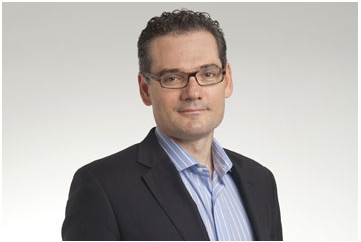English Français
George Coukos, lauréat d'un ERC Advanced Grant
Oncologue et pionnier de l'immunothérapie, le Prof. George Coukos, chef du Département d'oncologie CHUV-UNIL et directeur du LICR@UNIL, voit l'excellence de ses travaux saluée par l'octroi d'un «Advanced Grant» de l'European Research Council (ERC) doté de 2,5 millions d'euros pour une durée de cinq ans.

Pour des projets hautement ambitieux, novateurs et atypiques
Les "ERC Advanced Grants" sont destinés à des chercheurs de haut niveau reconnus au plan international afin de leur permettre de mener des projets novateurs et ambitieux tant en ce qui concerne les résultats scientifiques escomptés que la créativité et l'originalité des approches proposées. Ces projets impliquent également des innovations dans les méthodologies les plus récentes. Le fait que ces projets offrent l'opportunité d'une avancée exceptionnelle dans le domaine de recherche concerné justifie leur caractère innovant. De plus, les retombées scientifiques et méthodologiques des projets ERC s'étendent à de multiples disciplines et contribuent à la progression d'autres domaines de recherche.
Un projet d'immunothérapie contre le cancer de grande envergure à l'UNIL-CHUV
D'un montant total de 2.5 millions d'euros pour une durée de cinq ans à partir du 1er août 2013, ce financement ERC soutiendra un projet d'immunothérapie contre le cancer visant à comprendre les interactions entre l'endothélium des tumeurs et des lymphocytes T programmés pour détruire le réseau vasculaire tumoral. L'identification de ces mécanismes d'interaction permettra de diriger ces lymphocytes exclusivement contre le réseau vasculaire tumoral, tout en limitant leur réactivité contre le réseau vasculaire sain et en renforçant la réponse immunitaire contre la tumeur (voir le résumé du projet scientifique ci-dessous).
Development of Vascular-Disrupting Lymphocyte Therapy for Tumours (Antivessel-T-Cells)
With more than 3 million new cases and 1.7 million deaths per year, after cardiovascular diseases, cancer is the most important cause of morbidity and death in Europe (as reported by the World Health Organization, 2007). Despite great improvements in cancer treatments, a significant fraction of cancer patients do not respond to standard treatments and still face short life expectancies. A novel and effective immunotherapeutic strategy to enhancing anti-tumor responses is to adoptively transfer cytotoxic T cells that were isolated from the patients, expanded ex vivo and that either bear T cell receptors (TCRs) optimized for tumor recognition or that have been genetically engineered to express so-called chimeric antigen receptors (CARs) against tumor cells or its' vasculature. CARs are fusion genes encoding receptors, whose extracellular domain comprises a single chain variable fragment (scFv) antibody that binds to a tumor surface epitope, while the intracellular domain comprises the signalling module of CD3-zeta along with powerful costimulatory domains (e.g. CD28 and/or 4-1BB). CARs are a major breakthrough, since they allow bypassing major histocompatibility class (MHC) molecule-restrictions or -loss, and they can incorporate potent costimulatory signals tailored to optimize T cell function. Although results with CAR-based immunotherapy have been striking in chronic lymphoid leukaemia (CLL), solid tumors present unique challenges, since they are often genetically unstable, and the tumor microenvironment impedes T cell function. Blood vessels that develop in solid cancers are a much more stable and accessible target and this vasculature is essential for tumor growth since its disruption has catastrophic consequences for tumors. The objectives of the research performed in the laboratory of Prof. G Coukos is to develop potent and safe tumor vascular-disrupting tumor immunotherapy using engineered scFv's and CARs specific for vascular target molecules, some of which are almost exclusively expressed on tumor vasculature. These innovative CARs will be used to understand for the first time the molecular mechanisms underlying the interactions between cytotoxic anti-vascular CAR-T cells and tumor endothelium, and exploit this knowledge to maximize tumor vascular destruction. In addition, novel engineering approaches will be used to minimize destruction of vasculature in healthy tissues while keeping potent destruction of the tumor. Lastly, tumor damage mechanisms ensuing anti-vascular therapy will be manipulated, to maximize tumor rejection through immunomodulation. This research is poised to elucidate critical interactions between tumor vascular endothelium and anti-vascular T cells, resulting in innovative single or combinatorial cancer therapies for improving cancer patient outcome. The impact of this work could be transforming, given the applicability of tumor-vascular disruption across most common tumor types, resulting into leading-edge cancer therapy for large number of patients.
Prochains appels ERC:
-
Starting Grants (2-7 ans après le PhD)
Publication: 1er trimestre 2014 / Délai: 2ème trimestre 2014
-
Consolidator Grants (7-12 ans après le PhD)
Publication & délai: 2ème trimestre 2014
-
Advanced Grants (chercheurs confirmés)
Publication & délai: 4ème trimestre 2014
Informations: Euresearch Lausanne, Anne-Emmanuelle.deCrousaz(at)unil.ch; 021 693 47 50
par $author.firstName Communication FBM